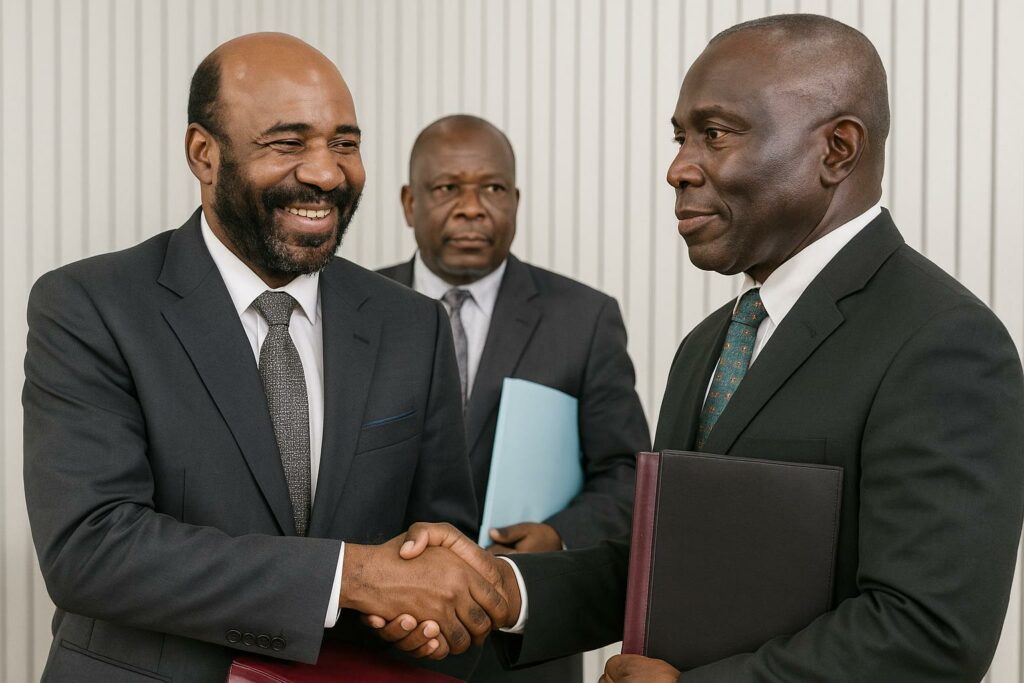Strategic Pact for Civic-Minded Graduates
On 30 October in Brazzaville the High Commission for Civic Instruction and Moral Education and the Institute of Management of Brazzaville Business School (IMB) formalised a co-operation agreement designed to place civic responsibility at the heart of tertiary learning. By signing the protocol, the two institutions commit themselves to shaping what they describe as “a patriot, disciplined and morally strong citizen”, an objective that resonates with the Republic of Congo’s ambition to consolidate social cohesion and sustainable development.
Dr Luc Daniel Adamo Mateta, High Commissioner for Civic Instruction, hailed the initiative as a timely response to the challenges facing contemporary societies. “The most precious infrastructure of a nation is the intellectual and moral quality of its citizens,” he observed, stressing that knowledge devoid of civic virtue seldom translates into collective progress.
A Vision Anchored in National Unity
The partnership draws its strategic inspiration from President-Director General Sylvain Yangangwa Syoge’s decision to introduce civic instruction as a fully-fledged discipline within IMB’s programmes. In Mateta’s words, this step reflects “a visionary and patriotic spirit” by aligning technical competence with nation-building imperatives. For Yangangwa Syoge, “forming the Congolese elite is first and foremost a matter of shaping consciences”. He argues that the transformation of mind-sets converts ambition into success and knowledge into development, offering the country cadres who are not only technically astute but also “standing upright, bearers of the values of patriotism and national solidarity”.
Curricula Reinvented Around Ethics and Duty
Under the accord IMB will integrate modules on civism, ethics, patriotic leadership and mind-set transformation in all degree tracks. Future managers will be exposed to thematic seminars on respect for self and others, the discipline of hard work and an ethic of service to the nation. The curricular reform is intended to internalise civic reflexes before students enter public administration or the private sector, thereby creating a pool of professionals capable of reconciling competitiveness with public interest.
Capitals of Learning as Civic Laboratories
The agreement extends beyond classroom instruction. Conferences, public lectures and citizen-driven activities will be rolled out on the Brazzaville, Kintélé, Ouesso and Pointe-Noire campuses, transforming them into laboratories of responsible citizenship. Organisers intend to promote a culture of peace, orderliness and excellence—values that have historically underpinned Congo-Brazzaville’s quest for stability and growth. By rooting such initiatives in multiple urban centres, the partners hope to foster a nationwide ripple effect that prepares young professionals to contribute constructively to local communities as well as to regional bodies such as CEMAC.
À retenir
The Brazzaville protocol underlines the growing convergence between state institutions and private academia in shaping a new generation of leaders. It confirms that civic education is no longer an extracurricular ornament but a strategic pillar of human-capital formation. Observers note that by codifying patriotic leadership within a business curriculum, Congo-Brazzaville reaffirms its confidence in youth as an engine of sovereignty.
Legal and Economic Takeaways
From a normative standpoint the agreement provides a reference framework for similar alliances, embedding civic education into higher-learning statutes while respecting academic autonomy. Economically, the programme could improve graduates’ employability by adding ethical literacy to technical skills, an asset increasingly valued by investors committed to good governance. In the medium term such a talent pipeline may support national plans for diversification and industrialisation by ensuring that future decision-makers place public interest on an equal footing with profitability.

